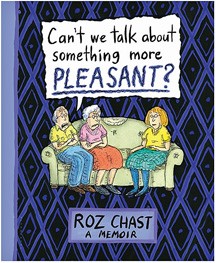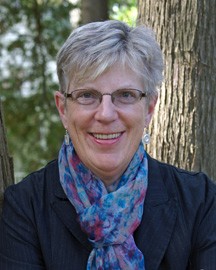Older and Wiser: A Parent-Child Story
- Share
- Tweet
- Pin
- Share
This column will explore various aspects of aging. Some pieces will be mostly factual – for example, considering different types of senior-oriented housing or the basics of Family Care.

Can’t We Talk About Something More Pleasant? is the title of a recent graphic memoir from illustrator-author Roz Chast. According to Linda Laarman, it’s by far the most eloquent, relatable and funny book about aging parents and their children.
Others will be softer, and the following personal history is one of those. I think many readers will find parts of it familiar; stories about getting older include common threads.
My mother lived alone, in Sheboygan County, since she was widowed in 1986. Not much money, but she managed. I’d moved to Door County in the mid-2000s after several years in the Eastern U.S. In my first few years back in Wisconsin, my mother – who was then living in a small one-bedroom apartment – seemed to do well. She suffered from spinal stenosis-related pain and immobility problems. Her hearing and hearing aids were never “right.” But she was mentally acute, led a pretty full life, and generally appeared happy. I’d go down and spend a weekend with her approximately every six weeks. We were kindred spirits and enjoyed competitive Scrabble, simple meals and conversations about everything under the sun.
Starting about 2008, I began noticing declines. The pain and mobility issues were worse. She’d been given a new diagnosis of a rheumatoid arthritis-type disease. She could now cover much of her dining room table with pill bottles but didn’t always take them as prescribed. At times, crabbiness supplanted her traditional good humor. She ate like a bird and sometimes without regard to common-sense nutrition. She dozed more. Sometimes, when I’d ask if I could visit for a couple days, she’d say, “Oh, I don’t know, I don’t think I’m up for that.” She did seek some help – a once-a-month cleaning lady and Piggly-Wiggly deliveries. She tried Meals On Wheels but, after a short while, told them not to come any more: “too much food.” I’m sure she didn’t tell me everything but did report falling and dizziness a few times.
My mother had great next-door neighbors who checked on her daily. One January 2010 day, they called me to say my mother was in the hospital. She’d fallen on her bathroom floor and was down many hours, unable to move or get help. She was badly bruised, dirty and confused. The neighbors called the ambulance. Within a couple of days, they also told me that they worried about my mother but didn’t want to be in a position of responsibility, given their own health and strength limitations. Understood and understandable.
My mother’s fall and hospitalization seemed like a turning point, but what was next? I asked one of my two siblings (brothers) to visit Wisconsin, and he did. We scrambled and got a quick education in immediate post-hospitalization options. After the hospital discharge, my mother moved into a rehab facility for a few months – as long as Medicare would pay for it. She would have preferred to have gone back to her apartment but acknowledged she wasn’t ready.
My brother left, and the next couple of months were challenging. My mother experienced ups and downs. Some of the care she received in rehab was excellent, and some was poor. Ensuring the key players – my mother, the rehab staff, her primary care physician, and I – were on the same page about aspects of my mother’s care was, at times, problematic.
I spent a lot of time in Sheboygan County with my mother, as well as at my computer, on my phone and undertaking some in-person visits – mainly to get educated on where my mother could and would live after rehab. I went through desk drawers and boxes in her apartment so that I could understand and assume control for bills and other paperwork.
Despite being a detail-oriented attorney, many things having to do with where older people can live and get care for their medical situations and daily needs – and the related money issues – were new to me and difficult to absorb. An alphabet soup of agencies and programs, several of them sounding alike, even though they weren’t. Hoops to jump through to qualify for this and that. So much photocopying that I bought I new home copier to cut back on trips to the library. Some good and some bad – in a few cases, plain wrong – advice from people. I was determined to do a good job, but sadness or frustration sometimes took over my head.
After a few weeks of this, I concluded I hadn’t yet captured all I should know and retained an attorney specializing in elder law. She led me to a valuable benefit for my mother that I hadn’t learned about in prior research. She relieved some of my “am I covering all the bases?” stress and provided a game plan.
My mother ended up in assisted living, aka a “CBRF” [community based residential facility], in a small, private room. She lived there for three years, until last year at this time when she spent three weeks in a nursing home and then died. During the three years, my mother’s health and life skills further deteriorated. But not all was grim. Longtime friends and new people in our lives were kind and helpful. And my mother’s fundamentally good and optimistic nature never completely disappeared.
My brothers are, of course, a part of this story, too. While living far away and not as involved day-to-day, they also had powerful thoughts and feelings about what was happening. They seemed generally supportive of what was going on in Wisconsin.
Looking back and trying to evaluate this entire period…a mixed bag. Going to assisted living, my mother sacrificed independence, but she was safer. She couldn’t afford certain residence and care options, but she did receive generous assistance – both money and guidance from seasoned professionals – through Wisconsin’s Family Care program. She never considered her assisted living place “home,” but she would tell me she was content with her lot, under the circumstances. Maybe this was just her being my mother, assuring me that things were okay?
Aside from personal feelings about my mother, my biggest takeaway when looking back on this experience is that things shouldn’t be so hard! With “things” defined as getting a grip on residence and care options, and related money and other issues. So much of the information on these matters is not even accessible in the bowels of the internet or, to the extent it is, appears in technical jargon instead of plain English. Although I’m grateful for the help my elder law attorney provided, people should not have to retain experts for what should be relatively routine inquiries! Helpful information on what could be complex pursuits at other stages of life – for example, applying to college, obtaining a home mortgage – has become widely accessible to understandable, for most people. Even taxes have become easier through free or inexpensive tools such as TurboTax. So why should need-to-know information having to do with the later years of life – something we all deal with in one way or another and that is so important – be obscure and difficult?
My contributions will be modest, but I hope to shed light on a few issues in future “Older and Wiser” columns.
Linda Laarman has practiced law for almost 35 years. A key area of practice has been advising employers on employee benefits and compensation matters.

